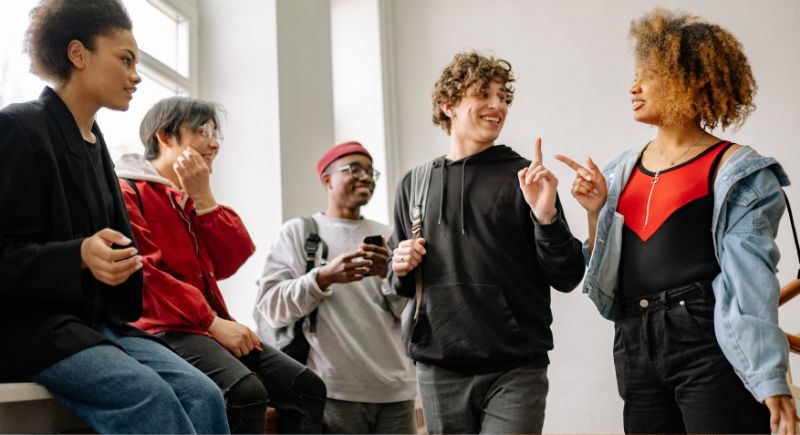10 Simple Ways to Boost Your Charisma and Win Everyone Over
Charisma isn’t some mysterious quality that only a few have. It’s a set of small habits that invite ease, spark curiosity, and attract attention. People see the way you carry yourself, how you speak, and how you listen.
The most magnetic individuals are those who just know how to connect. If you want to be one such individual, these practical strategies can help you leave a memorable impression in everyday moments, build better relationships, and leave people thinking, “I want to talk to them again.”
Make Eye Contact Without Staring

Credit: Getty Images
Looking someone in the eye establishes quick trust, but only when it is natural. Hold their gaze just long enough to show you’re present, then look away calmly. Too much eye contact can be intense, while too little creates distance.
Use Names While Talking

Credit: Undrey’s Images
People naturally perk up when they hear their name because it feels personal. Don’t overuse it; work it in once or twice when speaking. It makes the other person realize they’re seen, valued, and connected during your interaction, even in a short exchange.
Speak with Energy, Not Volume

Credit: pexels
The right way to hold attention is by bringing life into your words. Focus on pace, clarity, and tone. Add emphasis with slight pauses and inflection, not shouting. Listeners engage more when you sound excited about what you’re saying.
Ask Better Questions Than “How Are You?”

Credit: Canva
Small talk fades fast, but meaningful questions open individuals up. Try asking what they’re working on, what made them laugh recently, or what they’re excited about. Deeper questions show that you care about more than just politeness. They also permit others to be more honest and thoughtful around you.
Smile Like You Mean It

Credit: pexels
A genuine smile can turn a stranger into a friend. It doesn’t need to be constant or forced—just sincere. Let it reach your eyes. Smiling when greeting or reacting to a shared moment creates instant rapport.
Mirror Body Language Subtly

Credit: Monkey Business Images
If you want to make an individual feel understood, try matching their posture or movement. If they lean in, you can, too. If they’re relaxed, don’t stay stiff. These small cues foster trust and mutual ease, especially early in conversations or when trying to create a comfort zone.
Compliment Thoughtfully, Not Generically

Credit: Canva
A good compliment highlights effort, not just appearance. “You explained that clearly,” or “That was a smart way to solve it,” means more than “You look nice.” People appreciate it when you notice their contributions or personality traits.
Share Stories, Not Just Opinions

Credit: Getty Images
Telling a quick story adds life to what you’re saying. A moment from your week, a funny mistake, or something you learned helps others relate. Stories can capture interest more effectively than plain facts and reveal your personality without oversharing.
Keep an Open Posture at All Times

Credit: Photo Images
Your body gives away more than your words. Crossed arms, turned shoulders, or clenched fists can signal defensiveness or disinterest. Stay relaxed, square your body toward the person, and keep your hands visible.
Respond with Curiosity, Not Judgment

Credit: pixelshot
You don’t have to agree to stay interested. Instead of correcting them or changing the topic, ask more. “That’s interesting—what made you think that?” encourages conversation rather than ending it. It demonstrates that you are listening with care, even when your perspective differs, which helps the other person feel comfortable sharing.
Put Your Phone Away Entirely

Credit: pixelshot
Even one glance at your screen can evoke feelings of being ignored. Keeping your phone out of sight signals undivided attention. It doesn’t mean you must make dramatic gestures—just avoid checking notifications or texting mid-conversation. People remember who gave them importance, especially in a distracted world.
Laugh at Yourself When the Moment’s Right

Credit: pexels
Self-deprecating humor reflects self-assurance when used lightly. Laughing at your own small mistakes puts people at ease and reveals a relaxed self-view. It humanizes you. The key is to keep it light—poke fun at a slip-up, not your entire self. It relaxes others, too.
Embrace Silence Instead of Rushing to Fill It

Credit: Getty Images
Pauses can deepen a talk. After someone speaks, don’t pressurize yourself to jump in immediately. Let the moment breathe. The small silence gives them room to continue, and indicates you genuinely consider their words.
Say Thank You in a More Personal Way

Credit: Getty Images
Generic thank-yous get overlooked. Try being specific: “I appreciated you waiting for me today,” or “Thanks for explaining that—I didn’t know.” Specificity helps others recognize that their contribution was noticed. They’ll be more likely to remember your words and feel positive about your interaction long after it ends.
Avoid Gossip or Complaining in New Groups

Credit: Syda Productions
Negativity kills charisma quickly. Even if others join in, you’ll stand out more by staying upbeat or neutral. If someone’s venting, listen, but don’t pile on. People are drawn to those who remain positive without being fake. It makes them experience safety around you and be more energized by your presence.
Mention Wins Without Making Them the Focus

Credit: Getty Images
If something good happens, share it, but don’t dwell. Instead of bragging, say something like, “That was a fun surprise—I didn’t expect it.” Letting others celebrate with you builds a connection without making it about status. The more natural you are, the more others cheer for your success.
Listen in a Visible Way

Credit: Canva
Eye contact, head nods, and thoughtful responses show you’re tuned in. Repeat a word or phrase they used, or ask a follow-up. People crave that level of validation of being heard and valued.
Invite Others In During Group Chats

Credit: studioroman
In a group, charisma means making space for others. Bring quieter voices into the conversation with a question or small prompt. “Hey, didn’t you have something to add on that?” lets them speak up without pressure.
Bring Up Small Details Later On

Credit: Canva
Mention something they said days earlier—like a trip, a project, or a favorite show—and people will feel special. You don’t need a perfect memory, just enough care to bring it up again.
End Conversations on a High Note

Credit: pexels
How you leave a conversation matters as much as how you start it. Wrap up with a smile, a genuine comment, or a clear follow-up plan. “I’ve enjoyed this, let’s catch up again soon,” goes further than a vague goodbye. People tend to remember how they felt at the end.